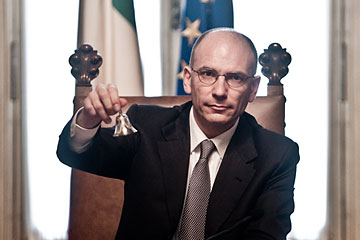
Italy's new Prime Minister rings a bell to mark the start of the first meeting of the new Cabinet in Rome on April 28
For anyone who's spent even a modest amount of time observing Italian politics, it was difficult to watch the aftermath of the country's elections in February and not think of the classic Italian novel The Leopard, by Giuseppe Tomasi di Lampedusa. Set in 19th century Sicily, at a time of crisis, the book's most famous sentence is an explanation delivered by a member of the island's threatened nobility as to why he is joining the rebels: "If we want things to stay as they are, things will have to change."
After more than a year of technocratic rule and an election in which voters expressed an impassioned desire for renewal, Italy is back in the hands of the politicians who have repeatedly failed to solve its problems. At 46, the country's new Prime Minister, Enrico Letta, may be young by the standards of Italy's ruling class, but he's also a representative of Italy's political elite, a high-ranking member of the center-left Democratic Party who accepted his first ministerial post in 1998. Meanwhile, Silvio Berlusconi, the scandal-plagued former Prime Minister, is back at the heart of power with his party's secretary, Angelino Alfano, confirmed as Deputy Prime Minister and Interior Minister. Letta will be dependent on the center-right Berlusconi's support as he begins the task of trying to change a country dangerously stuck in its ways.
Italy's economy has been stagnating since the beginning of the century. The country's labor laws constrain growth. Its justice system is sclerotic. Its schools are failing. It has high taxes and creaking public services. The country needs reforms in all of these sectors if it is to grow its economy and pay off its public debt, but its elected politicians have proved incapable of making the necessary changes.
In 2011, in an attempt to short-circuit the normal political process, the country drafted Mario Monti, an austere technocrat whose main attraction was that he had been appointed, not elected. But by the time Italians headed to the polls, it was clear Parliament and Italians had lost patience with Monti. He had begun to balance the books but was perceived by many voters to have done little for long-term growth.
The result was electoral upheaval and two months of negotiations that have led to a coalition between Berlusconi's People of Freedom and Letta's Democratic Party. (Comedian Beppe Grillo's Five Star Movement, a protest party, won the most votes but refused to help form a government.)
Letta starts from a position of weakness. He is head of what is essentially a minority government, with Berlusconi as its most powerful shareholder. While the return to the status quo — along with indications by the European Central Bank that it would intervene in a liquidity crisis — has bought Italy a respite from the immediate pressures of the market, there's little reason to believe the Letta government will be able to tackle the country's long-term challenges.
Unions, a key constituency of the center-left, have already raised their voices against any modifications of the labor laws, and they're likely to oppose any serious changes to the education system or the sprawling government bureaucracy. Berlusconi's legal travails — he faces ongoing trials in which he is accused of corruption, abuse of office and paying an underage girl for sex — make judicial reforms problematic. When it comes to the economy, Letta's most popular proposal is a rollback of taxes introduced by Monti. But there's little indication as to where Letta would get the money to pay for those tax cuts.
And yet there is one area where Italy's new government has the potential to make a difference: there's broad consensus among the country's political class that Italy's electoral system needs to be overhauled, a consensus that includes Letta. One proposal for reform, championed by Berlusconi, is a French-style semipresidential system: this has the potential to reshape the relationship between voters and their representatives. Under that system, parliamentary candidates would be chosen by their constituencies, not, as they are now, by party bosses. The President would be chosen directly through a nationwide vote, rather than by parliament. That, or pretty much any, restructuring of the Italian electoral system might finally create a political class intent on the reforms Italy needs. Because for anything to change for the better in Italy, things can no longer stay as they are.
